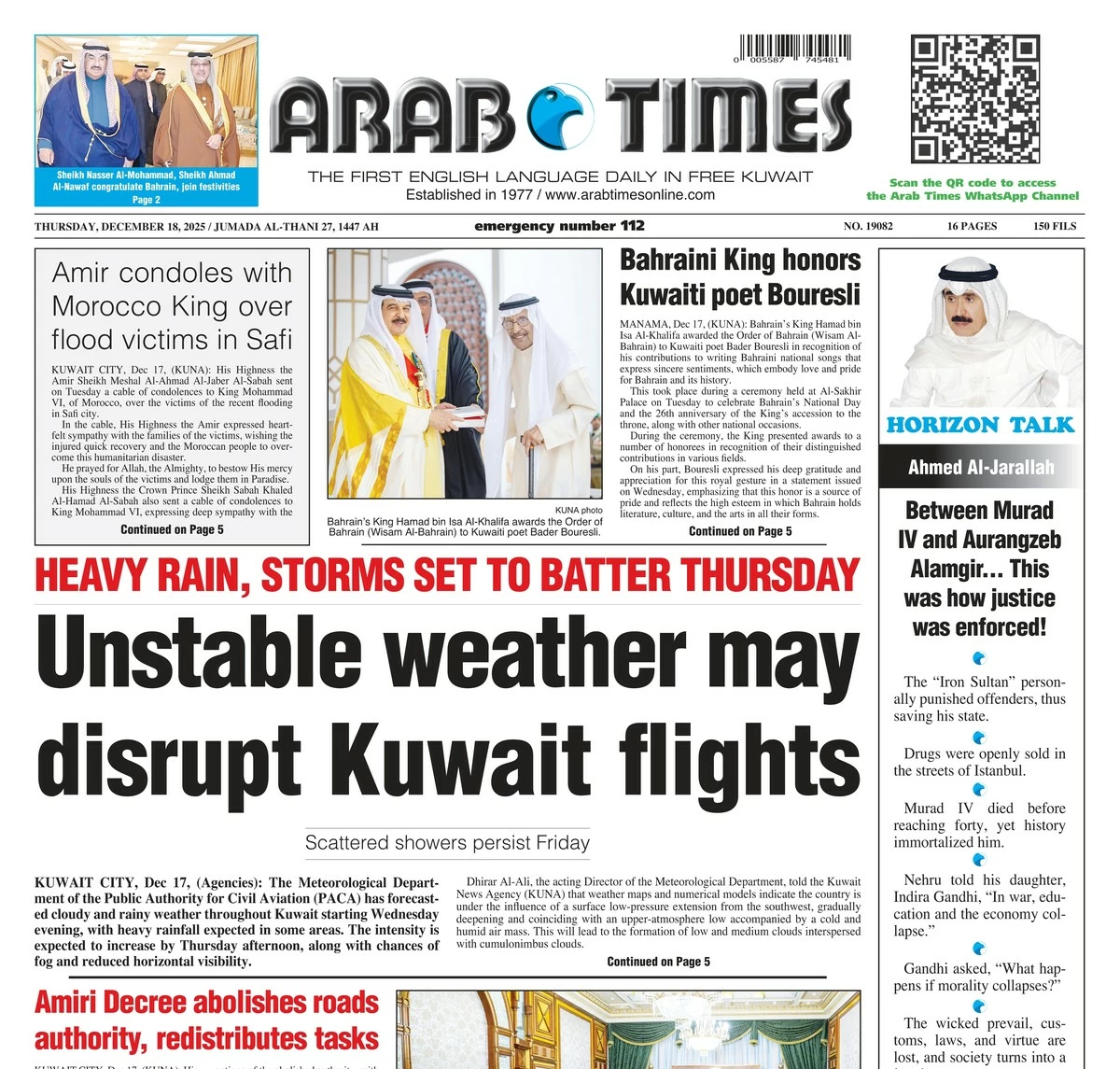15/05/2025
15/05/2025

“Second, there is a focus on increasing the efficiency of government spending by reducing waste and redirecting the budget toward development projects with a sustainable impact. Third and the most important, is the establishment of a modern and fair tax system that contributes to generating sustainable revenues, especially since taxes in Kuwait represent only a very small percentage of gross domestic product (GDP),” she elaborated. She cited IMF reports to support her view; indicating that non-oil tax revenues remain the lowest among GCC countries, as the State relies primarily on investment profits, not taxes. “The reports warned that this situation should not continue.
In addition, Kuwait is not saving enough for future generations, which reinforces the need for financial and structural reforms that support long-term justice and stability,” she revealed. She added that recognizing the magnitude of the challenges, the State has adopted a package of important legislation to support sustainability; most notably Decree-Law No. 60 of 2025 on Financing and Liquidity, which allows the government to borrow up to KD 30 billion over 50 years to finance the general budget, manage debt and fulfill obligations. She clarified that this step is considered a financial pillar to secure liquidity without compromising wealth funds or resorting to short-term solutions. “As part of the tax reform, the State, through the Ministry of Finance, announced the preparation of a selective tax law, which will be imposed on goods considered harmful to health like tobacco, energy drinks and sweetened beverages,” she stated.
She mentioned statistics from the Gulf Health Council, pointing out that implementing this tax at a moderate rate could generate revenues for Kuwait of approximately K 639 million between 2025 and 2029, while reducing cigarette consumption by around four billion cigarettes and sugary drinks by 220 million liters. “Revenues could reach KD 997 million if the tax is implemented at a higher rate,” she hinted. “The Ministry of Finance is also preparing a draft law to impose a tax on local business profits, a move aimed at expanding the tax base and promoting financial fairness, especially since Kuwait currently does not impose a profit tax on most local companies. This comes in parallel with the implementation of a global minimum tax on multinational companies. Decree-Law No. 157/2024 was issued regarding the imposition of a tax on multinational entities, known as the Domestic Transfer Tax (DMTT), in line with the second pillar of the Organization for Economic Co-operation and Development (OECD) initiative.
This legislation aims to limit tax evasion by large companies by shifting their profits to low-tax countries. It is expected to generate annual revenues estimated at approximately KD 250 million starting in fiscal year 2027-2028, according to Ministry of Finance estimates,” she added. Regarding tax challenges in the digital age, Al-Sayrafi asserted that despite the legislative momentum, the tax system in Kuwait continues to face big challenges, especially with the acceleration of digital transformation and the emergence of new economic models that are not subject to traditional tax frameworks. She said these challenges include the proliferation of cross-border digital services, which are provided without the need for a permanent physical presence or fixed headquarters in the country. “These services include streaming platforms, electronic applications, cloud software as a service (SaaS), and digital advertising,” she revealed.
She affirmed that these activities generate profits from the local market without being subject to tax accountability, creating a clear gap in tax justice and reducing the revenue base. “This is in addition to the widespread use of cryptocurrencies like Bitcoin and Ethereum, which represent decentralized assets that are difficult to track and are used in trading and investment without direct banking oversight,” she asserted. She explained that all these aspects open the door to tax evasion and money laundering, as well as to challenges in asset classification. “Are they treated as currency, capital assets, or commodities? There are practical complications in accurately determining their tax base.
“In the absence of a clear legal and regulatory framework in Kuwait to regulate these digital and virtual activities, there is an urgent need for modern, specialized legislation, accompanied by an integrated electronic infrastructure that links tax authorities with financial and technology service providers. This ensures transparency, compliance, and closing loopholes in tax evasion in the digital age,” she added. She said Kuwait is currently facing a pivotal moment, as it possesses the sovereign reserves and financial capabilities that qualify it to implement comprehensive tax and structural reforms from a position of strength, not under the pressure of crises. “The IMF has warned that delaying these reforms increases the fragility of the financial system and undermines confidence in its ability to withstand future challenges,” she stressed. She went on to say that building a modern tax system is not just about collecting revenues, but also about achieving social justice and establishing an effective partnership between the State and society in financing development and securing the future of future generations. “It is a national responsibility that requires conscious political will, clear legislation and societal confidence that reform today guarantees stability tomorrow,” she concluded.


